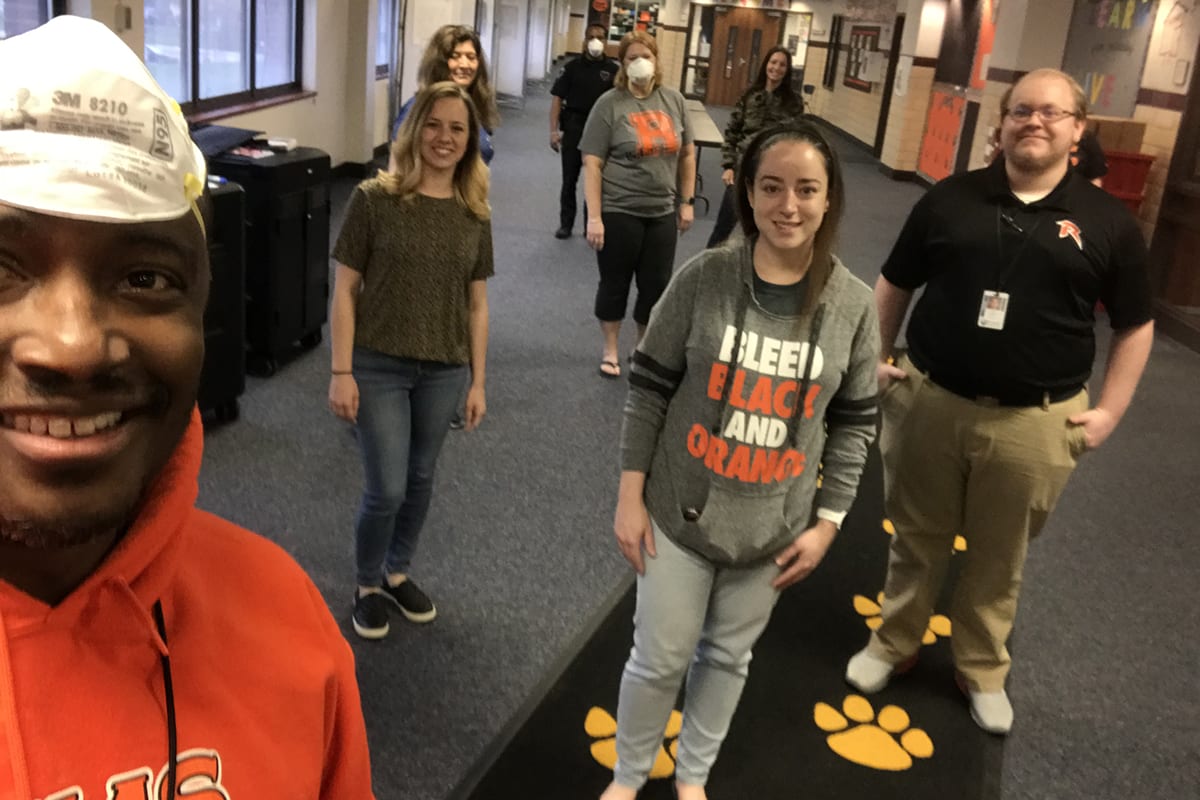Like many school districts across the nation, Ritenour School District made the difficult decision to suspend in-person classes during the coronavirus quarantine. The unexpected transition to distance learning meant that hundreds of Ritenour families needed to find access to technology and internet as quickly as possible.
Thanks to an existing partnership between Maryville’s Center for Access and Achievement and Ritenour School District, a donation of nearly 60 laptops was secured from The Boeing Company within days. The laptops were then distributed to Ritenour middle school students who needed the devices to continue learning at home.
“Maryville has been a longtime Ritenour partner, and the University has always found ways to provide access to communities, like ours, that might not otherwise have access to high-quality learning,” said Mike LaChance, EdD, assistant superintendent curriculum and instruction for Ritenour School District. “Maryville’s support during our COVID-19 closure fits right into everything they do on a regular basis. This time, it just happened to be during a global pandemic.”
Families picked up the laptops via curbside delivery at Hoech and Ritenour Middle Schools. The distributions were managed by a handful of Ritenour staff to ensure proper social distancing recommendations were followed. Families could also pick up Hotspots during the distributions, donated through a partnership with the St. Louis County Library, which could be used to set up free mobile internet access. The District also provided resources for families wishing to set up free internet access through Spectrum.
In addition to the device donation, Maryville’s Center for Access and Achievement created online learning opportunities for Ritenour elementary school students. Early on during the quarantine, district leaders identified several key Missouri Learning Standards that could be reinforced through interactive, online activities. The only caveat was that students needed to be able to complete the activity at home, without obtaining special supplies.
Millena Marler, who is studying education at Maryville, created an activity asking students to write new lyrics to one of their favorite songs to help them remember the meaning of prefixes. The students were then asked to record themselves performing the new lyrics using a smartphone or other device. Marler created her own music video, based off the song “Old Town Road” by Lil Nas X, to inspire students.
“While making my video at home, my children, who are in second grade and fourth grade, started playing with words and making up their own lyrics,” Marler said. “It was just amazing to see how my kids could have so much fun, and learn so much, by doing a new activity. It didn’t feel like learning when they were doing something creative and spontaneous like singing.”
Another activity by Kelly Douglas, who is also studying education, asked students to create a video on how to complete a project, like baking a cake or juggling. Douglas filmed herself making a peanut butter and jelly sandwich two ways: first following vague, incorrect instructions and second following clear, easy-to-follow instructions. The activity reinforced the importance of two learning standards: sequence of events and procedures.
“Our students used skills they learned in the classroom to facilitate learning that benefited hundreds of Ritenour students,” said Steve Coxon, PhD, executive director of Maryville’s Center for Access and Achievement. “Having a real-life audience encouraged our students to do their very best work. It’s one thing to prepare an activity of this kind for Maryville classmates. It’s a completely different thing to prepare an activity for an audience of eager elementary school children and their parents.”
Maryville students also collaborated with Ritenour School District staff while developing the online learning opportunities, including Michael Dragoni, EdD, ’09, ’13, ’17, who serves Ritenour as instructional facilitator for gifted and STEAM education. Dragoni received a Spirit of Maryville award in 2014 in honor of his professional achievements.
“It’s a unique experiential learning opportunity for our students to receive feedback and guidance from an industry leader like Michael,” Coxon said. “These students are learning skills now, before they graduate, that they will use in their future careers. They will also be able to discuss during job interviews how they made a difference during the unprecedented move to distance learning amidst the pandemic.”
